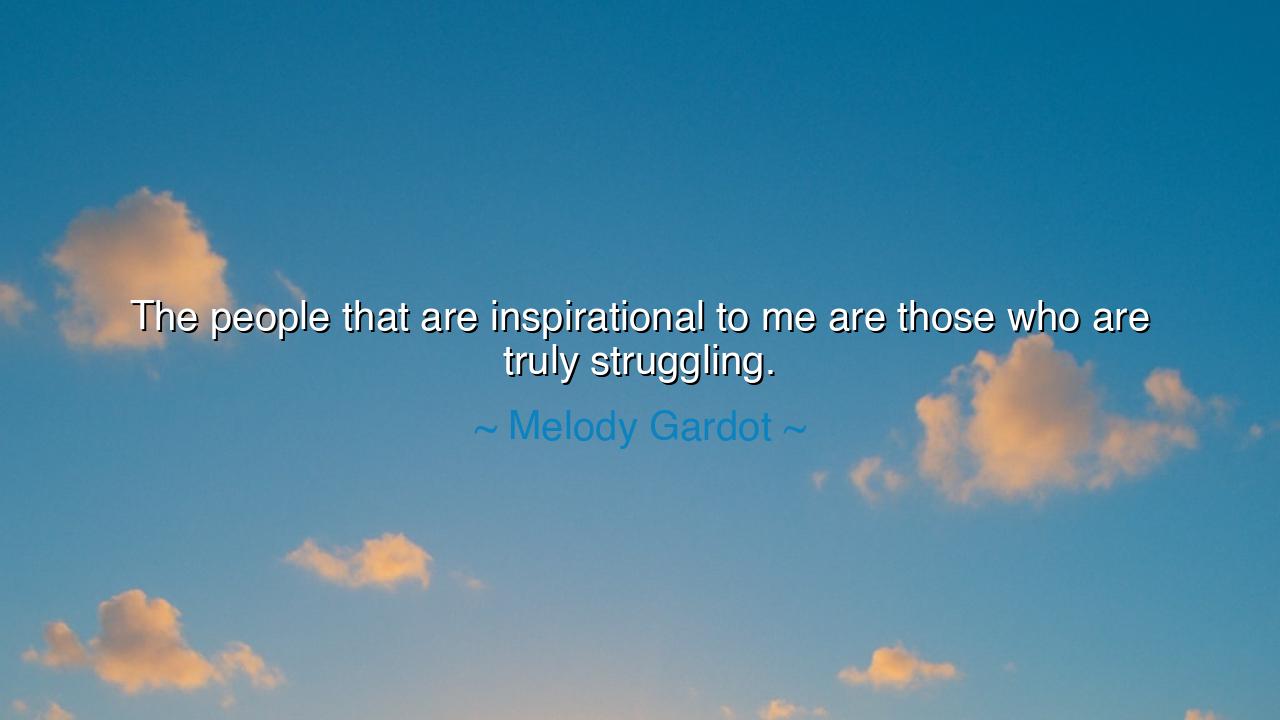
The people that are inspirational to me are those who are truly






In the profound and compassionate words of Melody Gardot, the singer whose voice carries both sorrow and transcendence, we hear a truth born of pain and empathy: “The people that are inspirational to me are those who are truly struggling.” These words do not glorify suffering, nor do they seek to romanticize hardship. Rather, they recognize that struggle, in its purest form, is the crucible in which the soul is refined. It is in the faces of those who fight against despair, who rise each morning despite invisible wounds, that we glimpse the deepest strength of the human spirit. For Gardot, whose own life was reshaped by trauma, inspiration is not found in perfection or ease, but in the endurance of those who refuse to surrender to the darkness.
The origin of this quote rests in Gardot’s own remarkable journey. As a young woman, she survived a devastating accident that left her severely injured and bedridden for months. Music became both her therapy and her salvation. Through the slow rhythm of recovery, she learned what it means to live within pain and yet create beauty from it. Her songs — filled with tenderness, resilience, and melancholy — bear witness to that truth. Thus, when she speaks of finding inspiration in those who are struggling, she speaks as one who has walked the valley of suffering herself. Her admiration is not for the triumphant, but for the enduring, for those who continue to love, to hope, and to create even when life has broken them open.
To understand Gardot’s insight is to recognize that struggle reveals the essence of character. When the body is weakened, the soul is laid bare; when comfort is stripped away, what remains is truth. The ancients knew this well. The philosopher Epictetus, once a slave, taught that suffering was not an obstacle but the very path to wisdom: “Difficulties are the things that show what men are.” Just as gold must pass through fire to be purified, so too must the spirit endure trial to discover its strength. Those who struggle, who grapple with pain, doubt, or grief, often develop a gentleness and compassion that the untested cannot know. Their courage is quiet, their victories unseen — yet they carry the wisdom of those who have looked into the abyss and chosen to rise again.
Consider the story of Helen Keller, born into silence and darkness, yet who through perseverance and the guidance of her teacher Anne Sullivan, opened her mind to the light of understanding. Her struggle was immense, yet it became the very wellspring of her genius. She did not simply overcome disability; she transformed it into insight, teaching the world that the human soul is far greater than the limits of the flesh. Like Gardot, Keller’s greatness did not come from privilege or ease, but from the alchemy of struggle, the transformation of pain into purpose. It is this — the ability to create meaning out of suffering — that Gardot finds most inspirational.
There is also a quiet nobility in everyday struggles that go unseen: the single parent working tirelessly to provide for their child, the caregiver tending to a loved one in decline, the refugee walking toward a horizon of uncertainty. These are the unsung heroes of our age — not crowned in glory, but radiant in their resilience. Gardot’s words invite us to look not upward at the idols of success, but inward, toward the human heart that continues to beat despite loss, fear, or exhaustion. She teaches us to honor not just victory, but the perseverance that precedes it.
And yet, within this acknowledgment lies a tender paradox: that beauty can coexist with pain. The struggling are not merely to be pitied; they are to be revered, for their lives demonstrate the sacred art of endurance. Like trees that grow stronger in harsh winds, they become symbols of quiet power. To witness their journey is to remember that life, though cruel, is also capable of grace. Their struggle reminds us that even in brokenness, there is music — a song of survival that echoes through time.
Let this, then, be the lesson of Melody Gardot’s words: do not turn away from the sight of struggle, for it is there that humanity shines most clearly. Be inspired not by those who never fall, but by those who rise again and again, their hearts stronger for the breaking. Seek not a life without difficulty, but a heart that remains open in the midst of it. When you meet those who suffer, do not look upon them with pity, but with respect — for they are teachers, showing what courage truly means.
And so, dear listener, remember: the measure of inspiration is not perfection, but perseverance. The most luminous souls are not those untouched by pain, but those who carry it with grace. As Melody Gardot reminds us, the truly inspirational are not the untouchable heroes of legend, but the ordinary men and women who continue to live, to love, and to hope — even when every step forward feels like a battle. Their struggle is not their weakness; it is their triumph, and in honoring them, we learn to honor the strength within ourselves.






AAdministratorAdministrator
Welcome, honored guests. Please leave a comment, we will respond soon